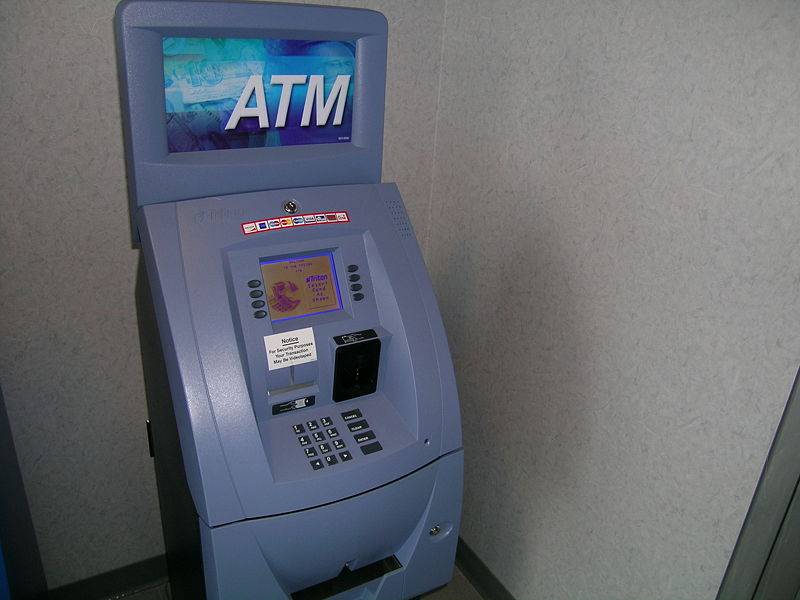
A couple of summers ago, Heather and I went on a baseball and sandwich tour. Best sandwich: Schwabl’s beef-on-wek. Best baseball atmosphere: Kalamazoo Kings.
Kings tickets were five dollars. The beer and hot dogs were cheap, too. And the Kings featured a Hank Greenberg protégé who hit the ball about 600 feet per at-bat.
The Kings play at “Mayor’s Riverfront Stadium,” which is sponsored by National City Bank. That seemed convenient. I have accounts with National City. But even better, they took credit cards. My credit card pays me 1% to use it, and automatically withdraws my balance from my bank account each month. I know how to use credit cards.
Bank-owned ballparks didn’t seem such a bad idea until we got to Pittsburgh. PNC Bank owns the naming rights to the Pirates Ballpark. They paid a little under 5% towards construction. The rest was funded by taxpayers. Those taxpayers, when they show up, buy their beer and hot dogs with cash only. The cash comes from PNC ATMs only. So the taxpayers either bank with PNC, or pay a not-banking-with-PNC surcharge, in the form of an ATM fee.

In the whole of the ballpark, there’s one place that takes plastic. It’s a pizza restaurant under the left field bleachers. They got my business. But Heather wanted a bratwurst. So I bought $20 from PNC, for only $21.50.
Next month I discovered my $20 actually cost $24. National City charged me for using someone else’s ATM. That’s right, they had zero administrative costs and zero maintenance costs. They charged me only because they could.
National City Bank stole my money.
I wrote a letter.
My letter featured a magic word: usury. And before long, I began seeing advertisements for a new policy at National City. If you bank with them, you get free ATM usage and they will pay your ATM fees for using other bank’s ATMs. With a minumum daily balance of $10,000.
I didn’t write another letter. I just stopped keeping money at National City. I lowered the minimum balance requirement by accepting a smaller interest rate (which was paying something like .87% anyway). Two can play at this Free Market game.
PNC now owns National City. So maybe a day at the ballpark will now cost $100 no matter where you roadtrip. That’s fine. I’ve got the Danville Dans.
—
Whatever your bedrock principles, from the farthest right wing (anarchist) to the ultimate left wing (commune), you are seeking to regulate the marketplace.
Some regulation of markets will always be with us. And for things like banking, and food safety, we rely heavily on Congress to protect us.
The ATM business is a fiasco for the stupid and the idle rich. I don’t think it’s government’s place to stop the rich from taking advantage of themselves, and government has never shown forgiveness to the willfully ignorant. Not where financial contracting is involved, anyway.
But here I speak only of privately owned ATMs, e.g. I worked at a bar that decided to stop accepting credit cards (ownership pays a fee) and installed an ATM machine (patrons pay a fee … to the owners).

That’s a private money changing act. Bank ATMs are different. They are the access point to money that already belongs to you. If you are silly enough to bank with an institution that charges you for access to your money, that’s okay.
But government must have the ability, and the will, to interfere in contracts if and when regulated banks change those contracts midstream. National City decided to change my contract one day. Once a bank has your money — and this is an important point, it’s your money — they cannot be allowed to change the rule about how much of it you get back.
—
The California General Assembly once made international news by threatening to outlaw all ATM fees. It’s the single biggest example of government intruding on a private contract since the Slaughterhouse Cases (when government should have interfered, but didn’t).
It was an irresponsible move, because there really are a lot of costs involved in operating ATM machines — costs banks are generally willing to absorb on behalf of their customers, but not anyone on the street.
It’s this sort of brainless regulation that gives a bad name to government’s legitimate regulatory functions. Here’s another, from last week:
The preposterous Walter Isaacson showed up on the (free) Daily Show, one of the great (free) sources of information and analysis. He non-funnily, and not even sardonically suggested that internet information sites should carry a fee. He means a tax. He means you pay more. So he and his friends can have more money.
Leeriness should permeate your entire being when you hear this sort of straight-faced suggestion. Do you really think the BBC doesn’t censor its own journalists?
This is a vital time to be vigilant about government’s fingers and your money. As I said a couple of weeks ago, the local economy will be okay as long as SURS and TuRS are in good shape. Unfortunately, they’re not. Wall Street absconded with the money. And when I say “Wall Street” I mean “bankers.”
We are in Deep Voodoo.








